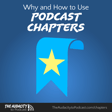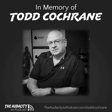
Avoid These Words in Your Podcast Title
Your podcast's title might be the single most important text for your podcast. The best titles will clearly communicate your subject to potential audiences and stand out in relevant search engines.
Yes, there are plenty of highly popular podcasts with less descriptive titles. But they became successful despite their titles because they had a lot of good marketing. However, even a look through the current top charts in Apple Podcasts left me having to do very little guessing about the subjects of most of the top shows because of their mostly descriptive names and relevant cover art.
Most of us podcasters don't have vast marketing budgets to compensate for “bad” titles. But there are some words I suggest avoiding in your podcast title, to help you optimize for search, uniqueness, branding, comprehension, and usage.
The following are only guidelines not “laws.” So if you break these, break them intentionally and with good reasons!
1. Ambiguous cuteness (01:39)
It can be cute to replace words like “to” and “for” with the numbers 2 and 4, but that cuteness can cause confusion, especially if your current or potential audience will need to type it in. Or maybe you get cute with the spelling, like “Wut Nuw wit U?” or replacing C's with K's or S's with Z's.
If you do cute things with your title, you might have to always clarify it, like saying, “That's the number 2,” or having to always spell it out.
I'm not suggesting avoiding all forms of cuteness—although you should still consider it—but avoiding what would be ambiguous to a listener.
If you do go with cuteness, try to get the other potential understandings of your titles as domains and social-media IDs (where you promote) and point those misunderstood or “typo” versions to the correct place.
If you're worried about your cute title being used uncutely by someone else, then the best protection will come from claiming it as a trademark and registering that trademark where you can.
2. Easily misunderstood made-up words or mashups (03:53)
Similar to being cute, it seems the “dot com era” made it popular to make up new words or mash parts of words together—the latter actually being called a portmanteau. For example, I could mash up “entrepreneur” and “father” to get “entrefather” or “fatherpreneur.” Or I could mash up “investment” with “analytics” to get “investalytics.”
However, the key is to avoid easily misunderstood things. I actually think these mashups might be easy enough to understand. And made-words or mashups are much easier to trademark because of their distinctiveness. (I have a pending trademark that leverages this same idea.)
Language changes, and some portmanteaus are so popular that they've been defined in the dictionary, spellchecks don't flag them, and most people wouldn't even have to wonder what you're talking about. For example, “smog” was a combination of “smoke” and “fog” that started way back in the 1800s! Everyone knows what “brunch” is. “Infotainment” is inherently clear that it is combining information (or “info”) and entertainment. And, of course, our own word “podcast” is a portmanteau of the words “iPod” and “broadcast.”
So it's not inherently bad to make up words or portmanteaus; it's only bad if it's easily misunderstood.
For example, “BuyFryer”—a podcast about purchasing air-fryers—could be misunderstood as “ByFriar”—a podcast critiquing the writings of a past friar. (Even the word “fryer” might be commonly misspelled as



















